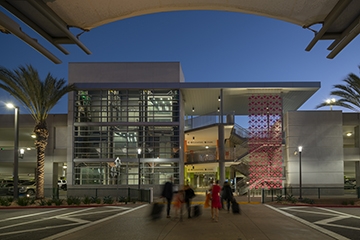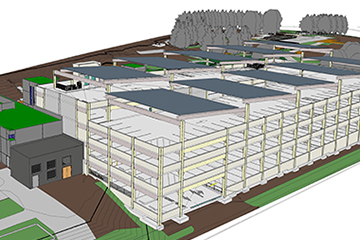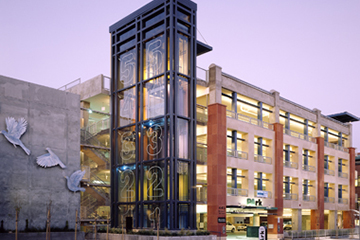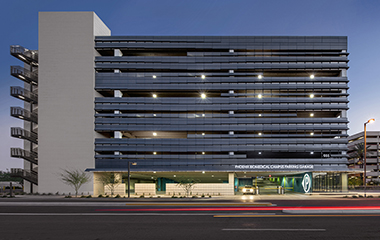 Watry Design's company culture has played a large role in retention. Our average tenure is over 9 years, with many employees spending their entire career with the firm.
Watry Design's company culture has played a large role in retention. Our average tenure is over 9 years, with many employees spending their entire career with the firm.
Every business wants to employ great people. From the big tech corporations in Silicon Valley to mom and pop storefronts, great companies owe their success not just to a superior service, but to a superior team behind that service. Finding and retaining that team is one of the ongoing challenges we face in business today, which is why a healthy company culture is vital.
As a boutique firm that designs parking structures, Watry Design has thrived for more than 45 years in large part because we have worked hard to create an environment that inspires. As a Principal and leader of our Southern California office, I take great care to nurture our company culture and set an example that allows us to both attract top talent and retain it. This means making Watry Design a place where people want to work. Here, each of our employees feels invested in the company’s success, loves what they do and are excited to come in every day and do it.
Creating this kind of environment isn’t the outcome of a board meeting, a memo or checking a box on a to-do list. It’s the result of more than 40 years of building and nurturing a set of ideals that our company lives by, a culture that defines who we are and who we want to be.
Team Effort
When you think about how much time we spend at work and with our coworkers, it’s easy to understand how important it is to make that time a positive, meaningful experience. Not only does it help you attract the best employees, but it also helps you keep them. And that’s not just valuable for your team – it’s also valuable for your clients.
Just like you don’t want to work with a dysfunctional client, clients don’t want to work with dysfunctional consultants, and it’s noticeable to everyone when a team does not function on all cylinders. A strong company culture shows the outside world that your confident, collaborative team is made up of people who can get the job done, while also being great to work with.
A robust company culture starts at the top. Employees are willing to go the extra mile if leadership is there to support them, and even be in the trenches with them at critical moments. When leaders provide a positive support environment, it allows their staff to take on greater responsibilities, think for themselves and manage up. Managing up not only helps the leader, but it also encourages the employee to grow personally and professionally and open up stronger lines of communication, all key ingredients to strong company culture.
High Trust Equals High Reward
The culture at Watry Design is predicated on trust and high expectations. To get our employees to manage up they need to feel empowered, valued and successful. As such, our leadership works hard to encourage professional development. We don’t just look for employees; we want to hire people who will grow and flourish while they are here.
At the start of every year, all of our staff identify goals, objectives, hopes and dreams, which are aligned with that year’s strategic planning goals. This process helps us understand what our staff is interested in and wants to achieve. Supervisors can then tailor an employee’s tasks for the upcoming year to help reach those personal and professional goals, which allows everyone to find a way to contribute to the company’s strategic plan for the year and become an integral ingredient to its success. The key to this kind of incentive is setting goals that are both actionable and measurable. When you have a plan that’s realistic, achievable and promises tangible results, you create accountability on all sides.
This kind of system requires a great deal of transparency. When everyone understands the corporation and how it functions, makes decisions and strategizes for the future, they have a greater opportunity to pursue their professional hopes and dreams in ways that align not just with their goals but also the company’s. This makes everyone feel like a valuable contributor, which is a win-win for all.
 The corporate culture of the Watry Design Irvine, CA office features impromptu basketball tournaments that encourage fun team interaction.
The corporate culture of the Watry Design Irvine, CA office features impromptu basketball tournaments that encourage fun team interaction.
Leading by Example
Maintaining the company culture you have so carefully cultivated is a challenge in and of itself. It requires constant maintenance and reinforcement, even when workloads - and stress levels - are high. This means making the time to provide feedback and encouragement and always leading by example.
Leading by example is a very basic concept in principle, but requires that leaders always be cognizant of their actions and how they are perceived in the office. Listening to employees, reacting to their needs and concerns, stopping to discuss the second season of Stranger Things at the water cooler, impromptu basketball tournaments in our office (yes, we have a basketball hoop in our office), taking a 15 minute walk outside at lunch, and eating lunch together in the conference room even on busy days are all ways we set the example and show respect for our team. If your staff respects you, they will go the extra mile for you and enjoy their time doing it.
Overcoming Geography A firm with multiple offices can create other challenges. Company culture is not relegated to one location – it is a vital piece of your firm’s identity. But if we don’t take care to use it to strengthen the bond between offices, we risk identity crisis. Fortunately, we live in a time where it is extremely easy to communicate and work across distances and between offices, with resources from multiple locations making up a project team. Having a consistent corporate culture across offices makes it easier for team members to relate and work with each other, even if they do not see each other all of the time.
This does not happen automatically, and requires effort to bring offices or teams together. All of the technology in the world can’t overcome the value of face to face interaction, and therefore Watry Design makes a point to ensure that our leadership visits each office periodically. Giving the staff face time positions the firm’s leaders as colleagues instead of remote bosses, which builds relationships that facilitate stronger cross-office collaboration.
The firm also organizes events each year that brings all of the staff from all three of our offices together. This gives us the chance to team build, recognize everyone’s efforts and celebrate success while providing an opportunity for staff from the various offices to get to know each other better on a personal level, which then helps efforts when working together on a project or a deadline.
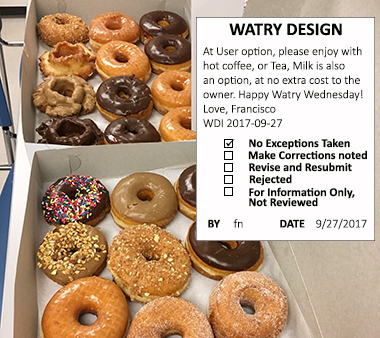 Watry Design's company culture encourages employees to bring treats when celebrating career achievements like licensing, or personal milestones such as additions to the family.
Watry Design's company culture encourages employees to bring treats when celebrating career achievements like licensing, or personal milestones such as additions to the family.
Finding the Right Pieces
The company culture Watry Design has cultivated is an essential component of our brand and something our team believes in. We call it “Fun, Love and Donuts,” representing hard work by driven people who take their work more seriously than they take themselves. Rising to the occasion, facing down deadlines with a smile, bad joke and often a tone-deaf song, and celebrating our successes (often with donuts) forms the bedrock of the Watry family. But even our employees will be the first to stand up and say that it’s not for everyone. Maintaining the company culture you’re striving for means hiring people who thrive within that culture. Therefore, patience is important when searching for the right candidate to fill an open position.
Quickly hiring out of desperation may provide a short term staffing solution, however it has the potential to create a long term problem if the candidate is not able to integrate into the office. Dealing with disconnects leads to internal conflicts with the other staff and inefficiencies in workflow. In the worst cases it can result in having to let someone go, which means the hours invested in training and onboarding a new hire have been wasted. One way to mitigate this problem is to place as much importance on how well a candidate will fit into the company culture as you do their skill set and past performance, and be willing to wait for the right person.
No matter what service your company offers, behind that service is a team of people who are vital to its continued growth and success. Without an established identity that defines who you are and who you want to be, it’s easy to lose the people who make your service so valuable to clients, or miss out on them altogether. So, how do you define your corporate culture, and how does it serve your brand?

